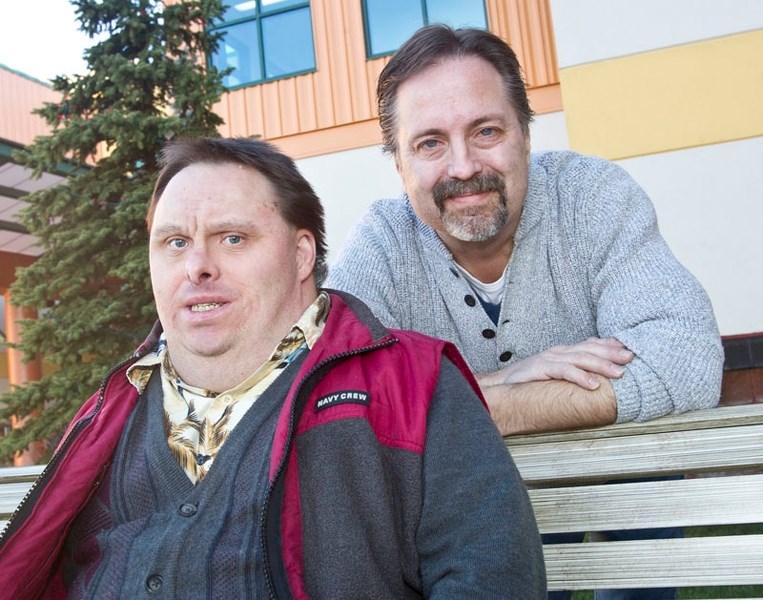On Oct. 21, Chris Sichkaryk cast his ballot in St. Albert’s municipal election for the very first time.
Chris is 45 years old and has Down syndrome.
His family and support workers believe that achievement could not have been conquered without family managed supports (FMS), a branch of services available to Persons with Developmental Disabilities (PDD) that puts the family in charge.
“It’s not so much customized as it is individualized. He drives the process,” said Vickie Mancini, Chris’ sister. Mancini works at the Gateway Association, an Edmonton-based organization that works with individuals with intellectual disabilities and their families.
For years Chris lived at home with his family, the youngest of 10 siblings. With aging parents, the family decided to move Chris to St. Albert under agency support in a group home.
Mancini said the group home life wasn’t good for Chris, support workers treated him like a child, he was heavily medicated on anti-psychotics and there was a lack of family involvement.
“Chris was physically, emotionally and financially abused. It wasn’t a good life for him,” she said.
That’s when the family switched to FMS. Mancini became the funds administrator, the person in charge of finding and paying support staff for everyday care, respite care and employment. She is also responsible for ensuring Chris gets the care he needs and deserves.
“The goal is to help Chris do what he wants to do. There’s some things he obviously can’t do but I’m there to help him complete those projects,” said Dave Platten, Chris’ supportive roommate. Through PDD funding, Chris lives with Platten and they run a handyman business together.
Platten, along with Donna Palfrey, Chris’ support broker who is in charge of hiring and training support staff, researched this year’s municipal election candidates and explained each of their stances to Chris so he could make an informed decision.
“Chris should have the same opportunities and the same life that every adult does,” said Palfrey. “People with disabilities just want the same things we want.”
On a typical day, Chris will hit the gym at Servus Place, do some handyman work, make dinner with Dave at home and maybe watch a bit of TV (lately the Miss Universe Pageant).
The difference between living under agency support and living under FMS, is that Chris is a lot happier, explained his workers.
“We ask ‘What do you want to do and how do we make it fit?’” said Palfrey of how FMS is organized. Compared to more regimented agency living, families can choose what supports the individual with the disability gets, including community day programs.
“How do you teach somebody that is not constrained by time? Chris doesn’t understand the concept of time. How do you teach him how to be punctual for a job?” she said.
“We make it sound easy but it’s not at all. It takes a lot of patience to be a support worker or a supportive roommate for Chris, a lot of understanding. We do a lot of trial and error.”
Mancini noted that caring for your loved one under FMS isn’t for the faint of heart. Having to work full time, care for her family and Chris, as well as having to negotiate funding contracts with PDD every year, would be very difficult to do alone, she said.
Despite the less expensive funding model – Chris receives slightly more than 300 support hours per month compared to at least 700 under agency care – Mancini said “his quality of life is 100 times better.”
One of Chris’ former support workers, Wayne Allchin, said he sees a noticeable difference in the 45-year-old, who was switched to FMS last year.
“He’s no longer an unwilling passenger on the road of life, he’s driving,” said Allchin. “Chris now, he’s alive. He digs it, he loves it.”
Family and support workers always thought they knew what was best for Chris, explained Mancini, but now with the help of FMS and a community of people, he is becoming his own person.
“He’s involved in all the decisions that we make,” she said, referring to Chris’ lead role in staff meetings.
“He is really a person becoming. I think this is the first time in his life where he’s really been allowed to be who he is.”
“The more people who get to know Chris, the better the world is. He has enriched my life.”




